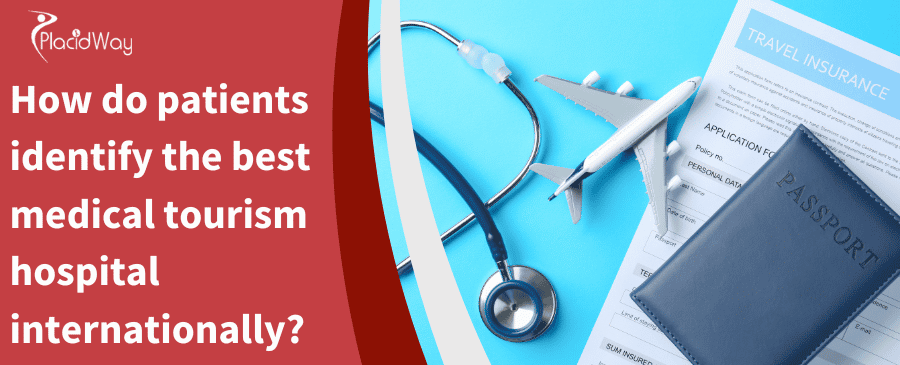How Patients Find the Quality Medical Tourism Hospitals Worldwide

Medical journey abroad, often referred to as medical tourism, can be a life-changing decision. Whether you're seeking specialized treatment, a more affordable procedure, or a shorter waiting time, choosing the right hospital and healthcare provider is paramount. This process goes beyond simply picking a facility from a list; it requires careful consideration, due diligence, and an understanding of international healthcare standards. Many people wonder how to confidently select a hospital in a foreign country, given the differences in regulations, language, and cultural norms.
The goal is to find a facility that not only meets your medical needs but also ensures your safety, comfort, and overall well-being throughout your journey. From verifying a hospital's international accreditation to understanding the qualifications of its medical staff and the clarity of its pricing, every detail matters. This guide will walk you through the essential steps and considerations, answering common questions to empower you with the knowledge needed to make an informed decision for your medical tourism experience. We'll delve into what truly makes an international hospital stand out, ensuring you can identify a trusted and high-quality provider for your healthcare needs.
What is the first step in identifying a reliable international medical tourism hospital?
Checking for international accreditations is arguably the most crucial initial step. These accreditations are third-party validations that a hospital adheres to stringent global standards for patient care, safety, and quality. Think of them as a seal of approval from an independent body, indicating that the facility has undergone rigorous evaluation.
- Joint Commission International (JCI): This is one of the most recognized and respected international accreditations. JCI evaluates and accredits healthcare organizations worldwide, ensuring they meet specific quality and patient safety standards. A JCI-accredited hospital demonstrates a commitment to excellence.
- Other Recognitions: While JCI is prominent, other reputable international and national accreditations exist. Research the healthcare landscape of your target country to understand their national accreditation bodies and whether they align with international best practices.
Verifying these accreditations directly on the accrediting body's website, rather than relying solely on the hospital's claims, provides an extra layer of assurance. This initial check helps filter out less reputable facilities and narrows down your search to institutions committed to high standards.
How important are doctor qualifications and experience in international medical tourism?
The expertise of the medical professionals performing your procedure is just as vital as the hospital's overall accreditation. You are putting your health in their hands, so their qualifications, experience, and specialization are paramount. When researching, focus on:
- Board Certifications: Do the doctors hold board certifications in their respective specialties? These certifications indicate a high level of training and expertise.
- Years of Experience: How long has the doctor been practicing, especially in the specific procedure you require? Experience often translates to better outcomes.
- Specialization: Ensure the doctor has a strong focus and a proven track record in the specific medical field or procedure you need. For instance, if you need cardiac surgery, look for a highly experienced cardiac surgeon.
- Professional Affiliations: Membership in international or respected national medical associations can indicate a doctor's commitment to ongoing learning and adherence to professional standards.
Many reputable hospitals provide detailed profiles of their doctors on their websites, including their education, certifications, and experience. Don't hesitate to request this information if it's not readily available.
What role do patient testimonials and reviews play in choosing an overseas hospital?
While accreditations and doctor qualifications provide a structural overview, patient testimonials and reviews offer a firsthand glimpse into the actual patient experience. These insights can be invaluable in understanding the human element of care, including staff attentiveness, communication, and overall satisfaction. Look for reviews on:
- Independent Medical Tourism Platforms: Many platforms specialize in connecting patients with international hospitals and often feature verified reviews.
- Google Reviews and Social Media: Check the hospital's Google Business profile and social media pages for public feedback. Look for patterns in positive or negative comments.
- Forums and Communities: Online forums dedicated to medical tourism can be a goldmine of information, as patients often share their experiences, both good and bad.
Pay attention to recurring themes in reviews, such as consistent praise for a particular aspect (e.g., nursing care, facility cleanliness) or repeated complaints about issues (e.g., hidden costs, communication breakdowns). While individual experiences can vary, a strong pattern often indicates a consistent level of service.
How can I ensure cost transparency when considering medical treatment abroad?
One of the primary drivers for medical tourism is often cost savings. However, it's crucial to ensure that the quoted price is comprehensive and transparent. Hidden fees can quickly inflate the final bill, turning an apparent saving into an unexpected expense. Demand a clear understanding of all costs of medical procedure involved:
- Detailed Breakdown: Request an itemized quote that includes not just the surgery or procedure fee, but also anesthesia, hospital stay, medications, necessary tests, and follow-up consultations.
- Accommodation and Travel: Inquire if the package includes or assists with travel and accommodation, and clarify if these are additional costs.
- Post-operative Care: Understand what post-operative care is included in the price, and if there are any charges for extended stays or additional therapies needed for recovery.
- Potential Complications: Ask about the financial implications if complications arise or if your stay needs to be extended unexpectedly. A reputable hospital will be upfront about these possibilities.
Ensure all financial agreements are in writing. Some hospitals offer all-inclusive medical tourism packages, which can simplify budgeting, but always scrutinize what "all-inclusive" truly covers.
What kind of communication and language support should I expect from an international hospital?
Effective communication is vital for patient safety and satisfaction, especially when receiving medical care in a foreign country. Language barriers can lead to misunderstandings regarding diagnoses, treatment plans, and aftercare instructions. A top-tier international hospital will prioritize clear communication:
- Multilingual Staff: Many hospitals catering to international patients employ staff who are proficient in multiple languages.
- Professional Interpreters: Beyond general staff, ensure the hospital provides professional medical interpreters for critical discussions with doctors and during procedures. Avoid relying on family members or casual staff for medical interpretation.
- International Patient Coordinators: Reputable facilities often have dedicated international patient departments or coordinators. These individuals serve as a single point of contact, assisting with everything from appointments and documentation to logistical support and cultural considerations.
- Written Information: Confirm that all important medical documents, consent forms, and aftercare instructions can be provided in your native language or English.
Before you travel, test the communication channels. Try corresponding with the hospital via email or phone to gauge their responsiveness and clarity in communication.
Why is post-operative care important, and how should international hospitals handle it?
Your medical journey doesn't end when you leave the operating room; effective post-operative care is crucial for a smooth recovery and to prevent complications. When evaluating an international hospital, understand their approach to aftercare:
- Detailed Aftercare Plan: The hospital should provide a clear, written plan for your recovery, including medication schedules, wound care instructions, activity restrictions, and signs of potential complications to watch for.
- Follow-up Consultations: Will there be in-person follow-up appointments before you return home? Does the hospital offer telemedicine or remote consultations for post-return check-ups?
- Coordination with Local Doctors: Ideally, the international hospital should be willing to communicate and share your medical records with your local doctor back home to ensure continuity of care.
- Rehabilitation Services: If your procedure requires physical therapy or other rehabilitation, inquire if these services are available at the hospital or if they can recommend reputable providers nearby.
Discuss the duration of your stay required for initial recovery and how long you should remain in the country for follow-up before it's safe to travel back home. A comprehensive aftercare strategy reflects a hospital's commitment to your long-term health.
Should I consider the technological advancements and facilities of the hospital?
Modern medicine relies heavily on advanced technology. A hospital equipped with the latest medical technology can offer more precise diagnostics, less invasive procedures, and potentially better outcomes. When assessing a hospital, look into:
- Diagnostic Equipment: Does the hospital have modern MRI, CT scans, and other imaging technologies?
- Operating Room Technology: Are operating rooms equipped with advanced surgical tools, robotic-assisted surgery systems (if relevant to your procedure), and integrated navigation systems?
- Intensive Care Units (ICU): For complex procedures, ensure the hospital abroad has well-equipped and staffed ICUs for critical post-operative care.
- Specialized Units: If your treatment requires highly specialized care (e.g., a dedicated cardiac unit, oncology center), verify the availability and quality of these specific facilities.
While cutting-edge technology is a plus, it should always be accompanied by qualified staff who are expertly trained to use it. A balance between advanced equipment and skilled personnel is key to quality care.
Are there legal or ethical considerations I should be aware of in medical tourism?
Traveling for medical care introduces legal and ethical complexities that might not be present in your home country. It's important to be informed about these aspects to protect your rights and ensure a safe experience:
- Patient Rights: Understand your rights as a patient in the destination country. Are they clearly defined and protected by law?
- Medical Malpractice Laws: Research the legal framework for medical malpractice in that country. What recourse do you have if something goes wrong? Pursuing legal action in a foreign jurisdiction can be challenging.
- Informed Consent: Ensure you fully understand and consent to all aspects of your treatment. This includes potential risks, alternative treatments, and expected outcomes. The consent form should be in a language you comprehend.
- Data Privacy: How will your medical data be handled and protected? Understand the local data privacy regulations and ensure your information remains confidential.
- Ethical Standards: Verify that the hospital and its medical staff adhere to ethical medical practices that align with international norms.
Some patients choose to consult with legal counsel specializing in international medical law or use a reputable medical tourism facilitator who can guide them through these considerations.
What about travel logistics and accommodation when choosing a medical tourism hospital?
While the medical aspect is primary, practical travel logistics and comfortable accommodation significantly impact your overall experience and recovery. A good medical tourism hospital or facilitator will assist with these elements:
- Ease of Travel: How easy is it to reach the medical tourism destination city and the hospital itself? Consider flight availability, travel time, and airport proximity.
- Accommodation Options: Does the hospital offer on-site accommodation for patients and their companions, or do they have partnerships with nearby hotels that cater to medical tourists? Look for options that prioritize comfort and accessibility during recovery.
- Transportation: Will the hospital arrange airport transfers and transportation between your accommodation and the facility for appointments and procedures?
- Visa Assistance: For some countries, obtaining a medical visa can be a complex process. Inquire if the hospital or a facilitator can provide the necessary invitation letters or guidance.
- Local Support: Having access to local support, whether through a patient coordinator or a designated contact person, can be invaluable for navigating unfamiliar surroundings.
Planning these logistical details in advance can significantly reduce stress and allow you to focus on your health.
When should I consider using a medical tourism facilitator?
A medical tourism facilitator acts as an intermediary, streamlining the entire process for patients. While not always necessary, they can be highly beneficial, especially for first-time medical travelers or those seeking complex procedures. A reputable facilitator will:
- Provide Vetted Options: They typically have established relationships with a network of accredited hospitals and experienced doctors, simplifying your search.
- Handle Logistics: They can manage travel arrangements, accommodation, airport transfers, and even visa applications.
- Facilitate Communication: They often provide language support and ensure clear communication between you and the medical team.
- Offer Transparent Pricing: Good facilitators will provide comprehensive cost estimates, helping you avoid hidden fees.
- Support Before and After: They can offer support throughout your journey, from initial inquiry to post-operative follow-up.
If you opt for a facilitator, ensure they are reputable, transparent about their fees, and have positive reviews from past clients. They should prioritize your best interests and provide unbiased information.
How can I verify the quality of medical equipment and technology used by a hospital?
The quality and modernity of medical equipment directly impact diagnostic accuracy and treatment effectiveness. While you may not be a medical expert, you can still make informed observations and inquiries:
- Accreditation Beyond JCI: Some specialized accreditations exist for specific medical departments or technologies (e.g., for imaging centers or surgical suites).
- Hospital Website & Brochures: Look for information detailing their technological investments. Many reputable hospitals proudly showcase their state-of-the-art equipment.
- Virtual Tours: If available, take a virtual tour of the hospital to see their operating rooms, diagnostic centers, and patient facilities.
- Ask Specific Questions: Don't hesitate to ask the patient coordinator or medical team about the age of their equipment, their maintenance protocols, and how frequently they upgrade their technology.
A commitment to advanced and well-maintained technology is a strong indicator of a hospital's dedication to providing high-quality care.
What is the importance of a hospital's reputation and awards?
Beyond formal accreditations, a hospital's general reputation and any awards it has received can offer valuable insights into its standing within the medical community and among patients. While not the sole deciding factor, they contribute to the overall picture:
- Industry Awards: Has the hospital received national or international awards for excellence in patient care, specific specialties, or innovation?
- Public Perception: What is the general public's perception of the hospital, both locally and internationally? This can be gleaned from news articles, professional reviews, and community discussions.
- Professional Recognition: Are its doctors or departments recognized as leaders in their fields?
A strong reputation built on consistent quality and positive patient experiences can be a reliable indicator of a hospital that delivers on its promises.
How do I assess the emergency and intensive care facilities of an international hospital?
For any significant medical procedure, understanding the hospital's emergency and intensive care capabilities is critical. While no one anticipates complications, knowing that robust support is available provides peace of mind:
- 24/7 Staffing: Confirm that the ICU and emergency department are staffed 24/7 by highly trained critical care specialists, nurses, and support staff.
- Equipment: Inquire about the availability of essential life-support equipment, such as ventilators, dialysis machines, and advanced monitoring systems.
- Blood Bank: Does the hospital have an in-house blood bank, especially if your procedure might require blood transfusions?
- Emergency Protocols: Ask about their protocols for handling medical emergencies, including rapid response teams and access to specialized care.
A comprehensive and well-equipped emergency and intensive care infrastructure demonstrates the hospital's readiness for any unforeseen circumstances.
What questions should I ask about potential complications and risk management?
Every medical procedure carries some level of risk. A responsible and ethical hospital will openly discuss potential complications and their strategies for managing them. This transparency builds trust and prepares you for all possibilities:
- Procedure-Specific Risks: Have an in-depth discussion with your surgeon about the specific risks associated with your particular procedure.
- Complication Rates: While not always readily available, you can ask if the hospital tracks and can provide data on complication rates for your specific procedure.
- Management Protocols: Understand how the hospital plans to manage complications if they occur, including the availability of specialists and resources.
- Financial Implications: Reiterate the earlier point about cost transparency regarding complications. How will additional treatments, extended stays, or re-interventions be billed?
- Emergency Evacuation: While rare, discuss options for emergency medical evacuation back to your home country if a severe complication requires it, and whether your travel insurance covers this.
A hospital that engages in open and honest dialogue about risks demonstrates its commitment to patient safety and informed decision-making.
How important is the cultural sensitivity of the hospital staff?
Traveling for medical treatment means immersing yourself in a different culture. A hospital that demonstrates cultural sensitivity can greatly enhance your comfort and overall experience:
- Respect for Customs: Does the staff show an understanding and respect for diverse cultural, religious, and personal preferences, such as dietary needs, prayer times, or modesty?
- Patient-Centered Care: Does the hospital focus on a patient-centered approach that considers your individual background and beliefs?
- Training: Inquire if the staff receives training in cultural competence to better serve international patients.
Small gestures of cultural understanding can make a significant difference in a patient's emotional well-being and recovery process.
What considerations are there for follow-up care once I return home?
The continuity of care after you return home is critical. A good medical tourism hospital will facilitate this transition seamlessly:
- Comprehensive Medical Records: Ensure you receive all your medical records, including diagnostic reports, surgical notes, medication lists, and discharge summaries, in English or your native language.
- Communication with Home Doctor: The hospital should be willing to communicate with your primary care physician or specialist back home to discuss your treatment and ongoing care needs.
- Telemedicine Options: If available, inquire about telemedicine options for remote follow-up consultations or to address any post-operative concerns that arise after your return.
Proactive planning for post-return care helps ensure your recovery continues without interruption and that your local doctors have all the necessary information.
How can I assess the safety and hygiene standards of an international hospital?
Patient safety and hygiene are non-negotiable. While international accreditations cover these aspects, it's still wise to be observant:
- Accreditation Focus: Accreditations like JCI place a heavy emphasis on infection control, patient safety protocols, and overall hygiene.
- Cleanliness: During virtual tours or if possible, in-person visits, observe the general cleanliness of patient rooms, common areas, and restrooms.
- Infection Control: Inquire about the hospital's infection control rates and their strategies for preventing healthcare-associated infections.
- Staff Practices: Note if staff consistently follow hygiene practices, such as handwashing and wearing appropriate personal protective equipment.
A clean and well-maintained environment, coupled with robust infection control measures, is fundamental to patient safety.
What if I need specialized treatment that is not widely available in my home country?
Some patients seek medical tourism for highly specialized or experimental treatments that are not readily available or approved in their home countries. In such cases, your search criteria will be even more focused:
- Specialized Centers of Excellence: Look for hospitals or clinics that are recognized as "centers of excellence" for your specific condition or procedure. These facilities often have dedicated teams, advanced research, and higher volumes of similar cases.
- Research and Innovation: If the treatment is cutting-edge, inquire about the hospital's involvement in clinical trials or medical research related to your condition.
- Team Approach: For complex cases, ensure the hospital employs a multidisciplinary team of specialists who collaborate on patient care.
For highly specialized needs, directly consulting with leading experts in your home country might provide valuable recommendations for international facilities.
How can I verify the reliability of a hospital's testimonials and reviews?
While patient testimonials are helpful, it's important to approach them with a discerning eye, as some can be curated or even fabricated. To verify their reliability:
- Independent Platforms: Prioritize reviews found on independent, third-party medical tourism review sites, Google Reviews, and reputable healthcare forums, rather than just the hospital's own website.
- Look for Detail: Authentic reviews often contain specific details about the experience, rather than generic praise. For example, a detailed account of a nurse's kindness or a specific aspect of the recovery process can be more trustworthy.
- Check for Consistency: Look for consistent themes across multiple reviews from different sources. If many patients praise the same aspect, it's likely true.
- Beware of Overly Positive or Negative Trends: While extreme reviews exist, be cautious of a profile with only 5-star reviews or only 1-star reviews, which might indicate manipulation.
- Consider Response to Negative Reviews: A hospital that thoughtfully responds to negative feedback, showing a commitment to improvement, can be a positive sign.
Combining insights from various sources helps paint a more accurate picture of patient satisfaction.
What questions should I ask about the hospital's discharge process?
The discharge process is a critical phase, ensuring you leave the hospital prepared for ongoing recovery. A well-organized discharge plan minimizes confusion and reduces the risk of post-discharge complications:
- Discharge Instructions: Will you receive clear, written instructions about medications (what, when, how), wound care, dietary restrictions, and physical activity limitations?
- Medication Supply: Will the hospital provide you with an initial supply of necessary medications, or guide you on where to purchase them locally before your travel?
- Follow-up Appointments: Clarify any in-country follow-up appointments required before you are cleared for travel home.
- Medical Records Handover: Ensure all your complete medical records, including diagnostic results, surgical reports, and discharge summaries, are prepared for you to take home or sent electronically to your local doctor.
- Transportation: Will the hospital assist with transportation from the facility to your accommodation or the airport upon discharge?
A thorough discharge process is a hallmark of a hospital committed to comprehensive patient care.
How can I assess the convenience and comfort of the patient rooms and amenities?
While medical quality is paramount, your comfort during recovery significantly impacts your experience. When considering an international hospital, assess the patient rooms and amenities:
- Private Rooms: Are private rooms standard, or an optional upgrade? Private rooms offer more privacy and a quieter environment for healing.
- En-suite Facilities: Do rooms have private bathrooms? This is often a preference for hygiene and comfort.
- Comfort and Amenities: Inquire about amenities like comfortable bedding, adjustable beds, Wi-Fi access, television, and in-room temperature control.
- Companion Accommodation: If a companion will be traveling with you, can they stay in the room or in nearby designated accommodations?
- Food Services: What are the meal options like? Can they accommodate dietary restrictions or cultural preferences?
A comfortable and convenient environment contributes positively to your recovery and overall satisfaction during your medical tourism journey.
What security measures should an international hospital have in place for patients?
Your personal safety and security, especially in a foreign country, should be a priority. A reputable international hospital will have robust security measures in place:
- 24/7 Security: Confirm the presence of round-the-clock security personnel on the hospital premises.
- Controlled Access: Are entry and exit points monitored and controlled? Do visitors need to register?
- Surveillance: Is there adequate CCTV surveillance in common areas?
- Patient and Property Safety: Inquire about measures to protect patients and their personal belongings.
- Emergency Procedures: Understand the hospital's emergency procedures in case of fire, natural disaster, or other security threats.
A safe and secure environment allows you to focus solely on your recovery without undue concern.
For seamless guidance on selecting trusted international hospitals and planning your medical journey, explore PlacidWay's comprehensive solutions.


.png)




.png)
.png)
.png)




.png)


Share this listing